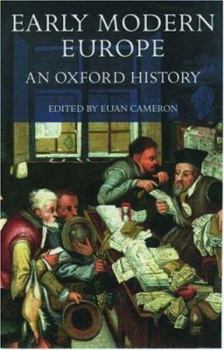Early Modern Europe: An Oxford History
Select Format
Select Condition 
Book Overview
This extensively illustrated book offers a new kind of introduction to Europe between 1500 and 1800. It considers the evolving economy and society - the basic facts of life for the majority of Europe's people. It shows how the religious and intellectual unity of western culture fragmented and
dissolved under the impact of new ideas. It also examines politics to consider the emergence of modern attitudes and techniques in governing.
Format:Hardcover
Language:English
ISBN:0198205287
ISBN13:9780198205289
Release Date:April 1999
Publisher:Oxford University Press, USA
Length:440 Pages
Weight:2.15 lbs.
Dimensions:1.2" x 9.8" x 6.3"
Customer Reviews
3 ratings
An Emminently Readable Survey of Early Modern Europe
Published by Thriftbooks.com User , 20 years ago
Early Modern Europe is a survey of European history from the 16th to the 18th centuries. Its three parts, one for each of the centuries the book covers, are each a collection of three essays by period historians. Scattered throughout are numerous illustrations and a few maps; though, oddly, the origins of many of the illustrations aren't cited except in the List of Illustrations. With so many authors it can be difficult to maintain a consistent tone and theme throughout. I found the style of nearly every author in Early Modern Europe to be, while not identical, at least similar enough that transitions between essays were fluid.Perhaps to make this survey seem more like a narrative and less pedantic cited works for each essay are relegated to the back of the book. Also, I can't recall a single end- or foot-note. I would have preferred the bibliography to be placed with each essay and that the text to have been supplemented with footnotes. But lest that criticism seem too harsh I will say that the authors achieved the monumental task of reducing the historical fact, and conjectures, of three centuries into eleven relatively short essays (including the Prologue and Epilogue) without losing too much.Anthony Pagden's, "Prologue: Europe and the World Around" was particularly interesting to me. This essay covers how the ancient Greek and Roman worlds, and the coming of Christianity, influenced the Europeans conception of themselves and their relationships to others. It explains, if only superficially, the European sense of "unity" and the belief in the superiority of Western Civilization; I use superficial not in its negative sense but to mean "on or nor the surface" i.e. the scanty 28 pages devoted to the subject can only be a survey rather than a critical analysis.The other essays in the book cover the life of the masses, war, religion, politics, and economics. Such a range of topics gives you a general sense of the times. And that is really the power of this book - a framework in which to locate other more intense readings on the particulars.
Very useful and compelling
Published by Thriftbooks.com User , 21 years ago
Have used the book as back-up to a high school Modern History course this semester. It is extremely well-written in many of the chapters and summarizes and encapulsates key points and moments during this period. It also updates the current state of scholarship in the field in places and overall is an interesting read. Worth the money if this is a time period of interest to you.
"Sailling in serene awareness towards its doom"
Published by Thriftbooks.com User , 23 years ago
A very interesting analysis of a world that wanted to go forth but did was afraid to break ultimately with its past.Behind the cabinet of Monarchist-Europe a world of new ideas,classes and ways of worshipping God were emerging stealthy and in the end will make any return to the past impossible.My favorite chapters were those of Alison Rowlands and Robin Briggs.I stayed a bit puzzled with Euan Cameron's aphoristic remark in page 87-we must not forget the class struggles in Augsburg,the revolt of the Netherlands or the role played by Brittish middle class in the establishment of a moderate religious tolerance for the first time-and T.C.Blanning's "natural end of Early Modern Europe".Germany was a problem for Europe in the seventeenth century also;is not better to stay attached to the feature of "authority" in this period?This attitude was gone for good after the Napoleonic expansion,despite his latter defeat.Why not be 1796(Italian expedition)a good suggestion?





